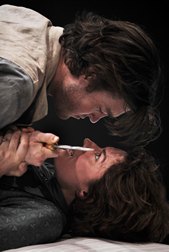SITE GUIDE
SEARCH
REVIEWS
REVIEW ARCHIVES
ADVERTISING AT CURTAINUP
FEATURES
NEWS
Etcetera and
Short Term Listings
LISTINGS
Broadway
Off-Broadway
NYC Restaurants
BOOKS and CDs
OTHER PLACES
Berkshires
London
California
New Jersey
DC
Philadelphia
Elsewhere
QUOTES
TKTS
PLAYWRIGHTS' ALBUMS
LETTERS TO EDITOR
FILM
LINKS
MISCELLANEOUS
Free Updates
Masthead
Writing for Us
A CurtainUp  London Review
London Review
 London Review
London ReviewCreditors
Creditors Makes a Stop at BAM David Greig's new version of August Strindberg's drama is currently making a stop at The Brooklyn Academy of Music's Harvey Theater 651 Fulton Street, Fort Greene; (718) 636-4100. The Bam-Donmar Warehouse co-production began its 1-month run April 16th and will continue through May 16. Same director, actors and creative team as in the production notes of our British critic's review. Performance schedule is Tuesday to Saturdays 7:30; Sundays at 3pm Curtainup reviewer Paulanne Simmons found herself in agreement with the review posted during the play's London run, and had this to say about the BAM production: The transfer from the intimate Donmar to the much larger Harvey stage may serve to emphasize the isolation of these characters, both from each other and the larger, saner outside world. It certainly gives Tom Burke, as the invalid husband, plenty of room in which to hobble about. But all that space does take away from the intensity of the drama. In Creditors there is no escape, and the audience should know it. |
Review in London by Charlotte Loveridge
|
If you look for honey in another man's hives, you shouldn't be surprised if you get stung.— Gustav
|

Tom Burke as Adolph and Anna Chancellor as Tekla
(Photo: Hugo Glendinning) |
The plot focuses on the relationship between an invalid husband and his older, free-thinking wife. In spite of their artistic lifestyles full of creativity and egoism, the shadow of the wife's former tyrannical husband, roundly and very publicly abused in her first novel, lurks over them. Meanwhile, the husband's physical weakness is matched by his spiritual impressionability and his emotional sanity starts to crumble. We see him interrogated by an apparently supportive mentor-medical figure, who advises him that he is in mortal danger of epilepsy, linked to his "excessive signs of love" for his wife.
In an accomplished cast of just three, each part is equally weighted and crucial. Tom Burke plays the husband Adolph as a weakling and voluble fool without utterly sacrificing pity for his plight. Anna Chancellor is his dazzling wife Tekla— self-centred, vain and proud, but also the most sympathetic of the characters. With her vision of humanity, ("No guilt - only people; fallen human beings trying to do the best they can"), it is a shame that her worldview is not reflected more in the play's own outlook. Owen Teale is the local doctor-style figure of Gustav, menacing in his phlegmatic calmness as he wreaks psychological devastation. Reminiscent of Iago, he is chillingly played as a manipulative force of sheer negation.
The set design by Ben Stones is a minimalist, white-washed stage of a Swedish hotel's lounge. Tall rain-streaked Velux windows tower above the stage and a moat of real water unobtrusively surrounds it, adding the vague sense of warfare, siege and inescapability.
This production is intelligent and earnest in spite of some rather clunkily directed movement. It is a play with a deep vein of misanthropy, as well as more specific misogyny. The characters simply are not likeable enough to guarantee interest, let alone sympathetic engagement. Although often compared to Othello, it lacks the heroism either of the angelically innocent Desdemona or the glorious stature of Othello himself. The overwhelmingly nihilistic impetus portrays a view of a warped human race where there is no hope, help or even mitigating explanation, just conflict without understanding. With vague theorising and rationalising, the characters are immersed in a mire of subjective half-truths and no single impartial version of the past is ascertainable. This annihilating vision of men and women's relations has palpable rawness, but also a desolation of spirit and warmth. The play may be deliberately appalling but this necessarily means that it is also a deeply unpleasant viewing experience.
|
Creditors
Written by August Strindberg Translated by David Greig Directed by Alan Rickman With: Anna Chancellor, Tom Burke, Owen Teale Set design: Ben Stones Costume design: Fotini Dimou Lighting design: Howard Harrison Composer and sound design: Adam Cork Running time: 1 hour 30 minutes without an interval Box Office: 0870 060 6624 Booking to 15th November 2008 Reviewed by Charlotte Loveridge based on 1st October 2008 performance at The Donmar Warehouse, 41 Earlham Street, Seven Dials, London WC2H 9LX (Tube: Covent Garden) |
|
REVIEW FEEDBACK Highlight one of the responses below and click "copy" or"CTRL+C"
Paste the highlighted text into the subject line (CTRL+ V): Feel free to add detailed comments in the body of the email. |
|
London Theatre Tickets Lion King Tickets Billy Elliot Tickets Mighty Boosh Tickets Mamma Mia Tickets We Will Rock You Tickets Theatre Tickets |




